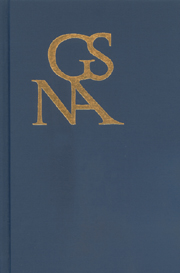Book contents
- Frontmatter
- Contents
- Presidential Address (December, 2004) Schiller vs. Goethe: Revisiting the Conflicting Reception Vectors of Heinrich Heine, Ludwig Börne, and Wolfgang Menzel
- Goethe's Mixed Media: The Entertainers in Jahrmarktsfest zu Plundersweilern
- Goethe's “Ilmenau” and the Origins of the Aesthetic State
- Familial Politics and Political Families: Consent, Critique, and the Fraternal Social Contract in Schiller's Die Räuber
- Paintings in Goethe's Wilhelm Meister Novels: The Dynamics of Erecting and “Eroding” the Paternal Law
- “Waldplatz,” “Wahlplatz”: Miszelle zur Golgatha-Konnotation einer Episode in Wilhelm Meisters Lehrjahre
- Shocks from a Sicilian Underworld: Gangi,“Gänge,” and a New Source for the “Mütter” in Goethe's Faust
- “Feuer brennen blau”: Rethinking the Rainbow in Goethe's Faust
- Cosmopolitanism and Weltliteratur
- “Von jedem öffentlichen Wirken in Deutschland ausgeschloßen”: Ein Brief Ottilie von Goethes an Sarah Austin (4. Aug. 1840)
- Book Reviews
Familial Politics and Political Families: Consent, Critique, and the Fraternal Social Contract in Schiller's Die Räuber
Published online by Cambridge University Press: 05 February 2013
- Frontmatter
- Contents
- Presidential Address (December, 2004) Schiller vs. Goethe: Revisiting the Conflicting Reception Vectors of Heinrich Heine, Ludwig Börne, and Wolfgang Menzel
- Goethe's Mixed Media: The Entertainers in Jahrmarktsfest zu Plundersweilern
- Goethe's “Ilmenau” and the Origins of the Aesthetic State
- Familial Politics and Political Families: Consent, Critique, and the Fraternal Social Contract in Schiller's Die Räuber
- Paintings in Goethe's Wilhelm Meister Novels: The Dynamics of Erecting and “Eroding” the Paternal Law
- “Waldplatz,” “Wahlplatz”: Miszelle zur Golgatha-Konnotation einer Episode in Wilhelm Meisters Lehrjahre
- Shocks from a Sicilian Underworld: Gangi,“Gänge,” and a New Source for the “Mütter” in Goethe's Faust
- “Feuer brennen blau”: Rethinking the Rainbow in Goethe's Faust
- Cosmopolitanism and Weltliteratur
- “Von jedem öffentlichen Wirken in Deutschland ausgeschloßen”: Ein Brief Ottilie von Goethes an Sarah Austin (4. Aug. 1840)
- Book Reviews
Summary
Introduction: Political Readings of Die Räuber
IN ACT 1, SCENE 2 OF Schiller's Die Räuber, Roller, a member of the wouldbe robber band, responds to Spiegelberg's recruitment plan with one of his own:
So unrecht hat der Spiegelberg eben nicht. Ich hab auch meine Plane schon zusammengemacht, aber sie treffen endlich auf eins. Wie wärs, dacht ich, wenn ihr euch hinsetztet, und ein Taschenbuch oder einen Almanach, oder so was ähnlichs zusammensudeltet, und um den lieben Groschen rezensiertet, wie's wirklich Mode ist?
It might seem odd that a band that will shortly cast its social lot in favor of robbery, rape, and murder would consider professional paperback or almanac writing. And Roller's proposal may be a joking reply to Spiegelberg's animated enthusiasm, but Spiegelberg refers to it again soon thereafter. It would seem that Roller's idea is more than a mere robber witticism. In fact, the passage—in particular the Latinate import “rezensiertet” as a “Mode”—points to tectonic shifts in publishing, the public sphere, and civil society that were afoot at the time of Schiller's famous play, written in 1781 and premiering in 1782. Roller's proposal deliberately references social and political changes that both circulate around the play and are articulated by it. Such references link the robber band to emergent social and political categories that underpin much of the play's action.
- Type
- Chapter
- Information
- Goethe Yearbook 13 , pp. 75 - 104Publisher: Boydell & BrewerPrint publication year: 2005



